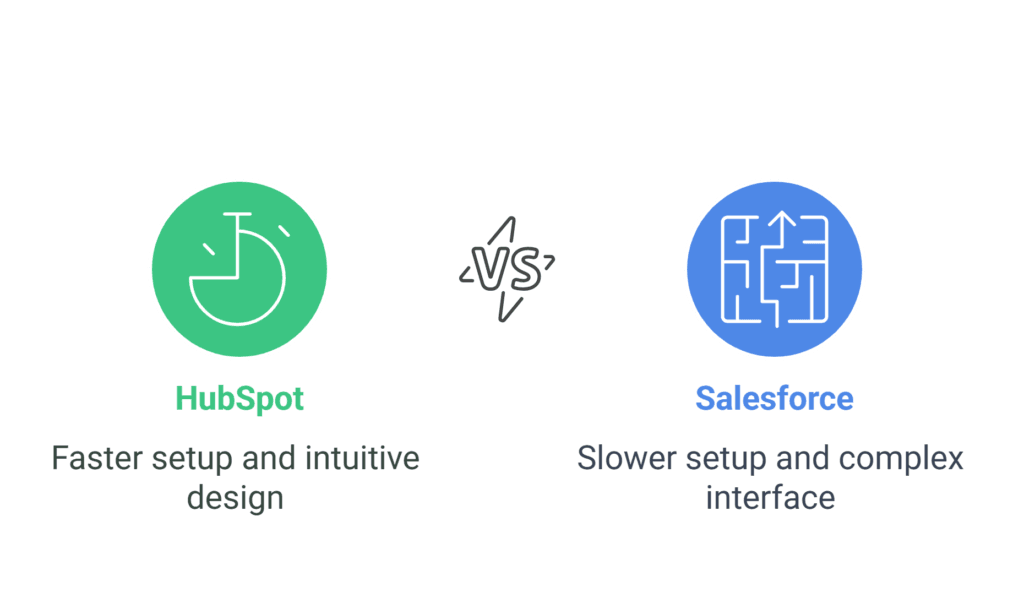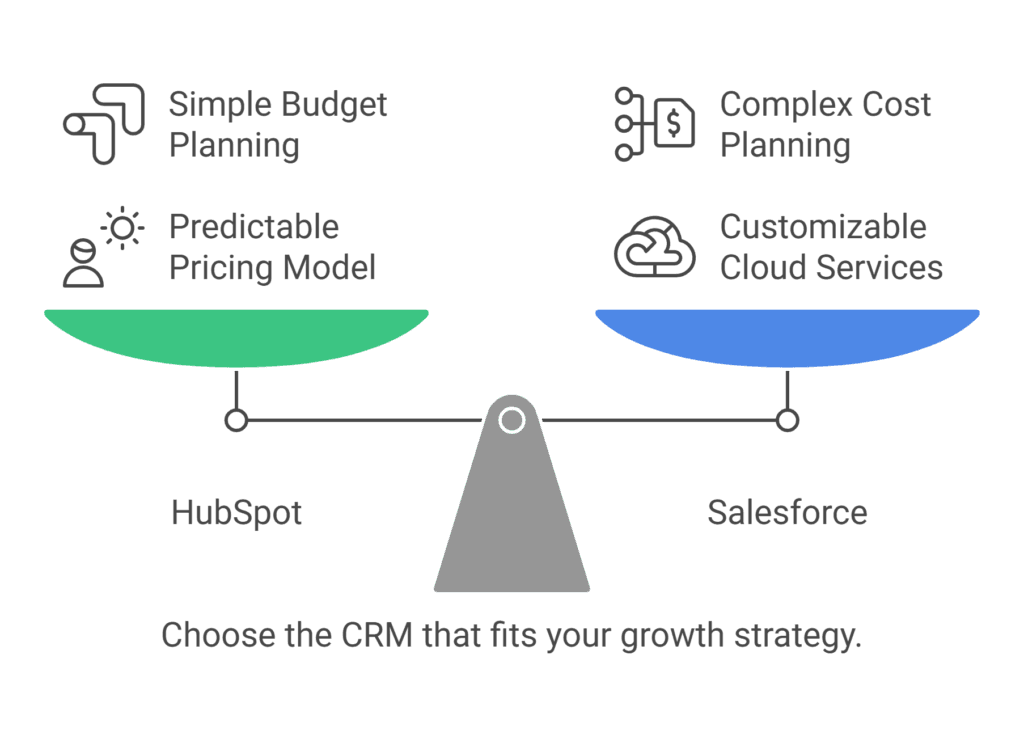HubSpot vs Salesforce The Definitive CRM Comparison for 2025
HubSpot vs Salesforce: With more businesses shifting to HubSpot in 2025, we explore why it’s becoming the preferred choice over Salesforce.
The CRM landscape has shifted dramatically in 2024, with HubSpot gaining significant market share against industry giant Salesforce. Recent market data from Grand View Research shows that 63% of businesses switching CRM platforms now choose HubSpot over alternatives. This striking shift reflects changing business priorities and evolving technology needs in the current market.
Understanding the Current CRM Market

The global CRM market has reached an impressive $63.91 billion in 2022, growing steadily at 13.5% annually. While Salesforce maintains its leadership position with 22% of the market share, HubSpot has carved out a significant 5.27% by focusing on user-friendly solutions that resonate with modern businesses. This growth trajectory signals a significant change in how companies approach their customer relationship management needs.
Core Platform Differences : HubSpot vs Salesforce

The differences between these platforms become clear when examining implementation timelines and user adoption rates. HubSpot typically takes 1-3 months to implement fully, while Salesforce requires 4-6 months. Teams learning HubSpot need 45% less training time, leading to faster deployment and quicker returns on investment.
User Experience & Setup Process : HubSpot vs Salesforce

Resonate HQ’s analysis reveals that teams master HubSpot’s interface 40% faster than Salesforce. Small businesses spend 15 fewer hours on initial setup with HubSpot, allowing them to focus more time on their core business activities rather than system configuration.
The platform’s intuitive design makes it particularly appealing to teams without extensive technical resources. Users can quickly navigate through features and start using advanced functionality without extensive training sessions or technical support.
Cost Structure & Value HubSpot vs Salesforce

HubSpot’s straightforward pricing model starts with free CRM core features and scales predictably with your business growth. Their transparent per-user pricing includes bundled marketing tools, making budget planning simpler and more predictable. As your business expands, you can add features without worrying about hidden costs or complex licensing structures.
Salesforce takes a different approach, structuring their pricing around separate cloud service fees and additional costs for premium features. While this offers more customization options, it can make long-term cost planning more complex, especially for growing organizations. Large enterprises often find value in this model, as it allows them to precisely tailor their CRM investment to specific departmental needs.
Marketing & Sales Tools : HubSpot vs Salesforce

According to HubSpot’s State of Inbound Report, businesses using their platform experience remarkable improvements in their marketing and sales efforts. Their marketing teams generate 40% more qualified leads while achieving 32% higher conversion rates. Even more impressive, these companies reduce their marketing costs by 28% through improved efficiency and automation.
The integrated nature of HubSpot’s marketing tools creates a seamless experience for both marketing and sales teams. Data flows naturally between departments, eliminating the silos that often plague growing organizations.
Integration Capabilities : HubSpot vs Salesforce

Modern businesses rely on numerous digital tools, making integration capabilities crucial for CRM success. HubSpot offers over 200 native integrations that work right out of the box, requiring minimal technical setup. These integrations cover essential business tools from email marketing to accounting software, creating a connected ecosystem that enhances productivity.
Salesforce’s AppExchange provides access to thousands of applications and integrations. While this offers more options, many integrations require technical expertise to implement and maintain effectively. Organizations with dedicated IT teams often appreciate this flexibility, as it allows them to create highly customized solutions.
Support and Training Resources : HubSpot vs Salesforce

Both platforms approach user support differently. HubSpot emphasizes self-service learning through their comprehensive Academy, which offers free certifications and training materials. Their support team provides quick responses through live chat and email, with most issues resolved within hours.
Salesforce offers multiple tiers of support, with premium support packages available for enterprise customers. Their extensive partner network provides specialized assistance, though these services often come with additional costs. The platform’s complexity often requires more ongoing support, which should factor into your decision-making process.
Future-Proofing Your CRM Choice
Looking ahead to 2025 and beyond, several trends will impact CRM effectiveness. Artificial intelligence capabilities continue to evolve in both platforms, with HubSpot focusing on user-friendly AI tools while Salesforce develops more sophisticated enterprise AI solutions.
Mobile accessibility becomes increasingly crucial as remote work continues to grow. HubSpot’s mobile-first approach provides a seamless experience across devices, while Salesforce offers robust mobile capabilities through their Salesforce1 platform.
Making Your Decision : HubSpot vs Salesforce
When choosing between HubSpot and Salesforce, consider your organization’s specific needs:

Choose HubSpot if you value:
- Quick implementation and user adoption
- Predictable pricing with included features
- Integrated marketing and sales tools
- Minimal technical overhead
Consider Salesforce if you need:
- Extensive customization options
- Complex workflow automation
- Enterprise-grade security features
- Advanced analytics capabilities
Conclusion
While Salesforce remains the market leader, HubSpot offers compelling advantages for many businesses in 2025. The choice depends on your specific needs, but HubSpot’s combination of user-friendly design, integrated marketing tools, and transparent pricing makes it increasingly attractive.
Recent analysis from LeanLabs suggests that businesses choosing HubSpot in 2025 benefit from faster deployment times, lower total ownership costs, and higher user adoption rates. The platform’s integrated approach to marketing and sales creates a unified experience that many organizations find valuable.
Feel free to explore HubSpot and see if it’s what you’re looking for 🌟
FAQs : HubSpot vs Salesforce 2025?
1. What are the main differences between HubSpot and Salesforce?
HubSpot is more user-friendly and cost-effective for small to medium-sized businesses, while Salesforce offers extensive customization and advanced features suited for larger enterprises.
Source: Salesdorado
2. Which platform is more affordable for small businesses?
HubSpot provides a free tier and lower entry costs, making it a more budget-friendly option compared to Salesforce, which has higher starting prices and implementation costs.
Source: Zapier
3. How do the marketing automation capabilities compare?
HubSpot excels in marketing automation with a focus on inbound strategies, while Salesforce offers more complex automation features that may be better suited for larger organizations.
Source: ElevatIQ
4. What are the customer support options available for each platform?
HubSpot offers user-friendly support suitable for self-service users, while Salesforce provides comprehensive support but often requires specialized knowledge for setup and maintenance.
Source: Ringover
5. Which platform is better for sales reporting and forecasting?
Salesforce has superior sales reporting and forecasting capabilities built into its platform, making it the preferred choice for users focused on these functionalities.
Source: Zapier
6. How does the onboarding process differ between HubSpot and Salesforce?
HubSpot’s onboarding is straightforward and quick, while Salesforce typically requires a more extensive implementation process that may involve third-party consultants.
Source: Chetan Mistry
7. What types of businesses benefit most from HubSpot?
HubSpot is ideal for small to midsized businesses that prioritize ease of use and cost-effectiveness in their CRM solutions.
Source: Salesdorado
8. Can both platforms integrate with other tools?
Yes, both HubSpot and Salesforce offer integration capabilities; however, Salesforce has a broader range of integrations available through its AppExchange.
Source: Chetan Mistry
9. What are the growth projections for HubSpot and Salesforce in 2025?
Both platforms are expected to grow; HubSpot will likely increase its share among SMBs, while Salesforce will maintain its dominance in the enterprise sector.
Source: ElevatIQ
10. Which platform is better suited for complex sales processes?
Salesforce is better equipped to handle complex sales processes due to its advanced customization options and robust sales pipeline management features.
Source: Salesdorado




